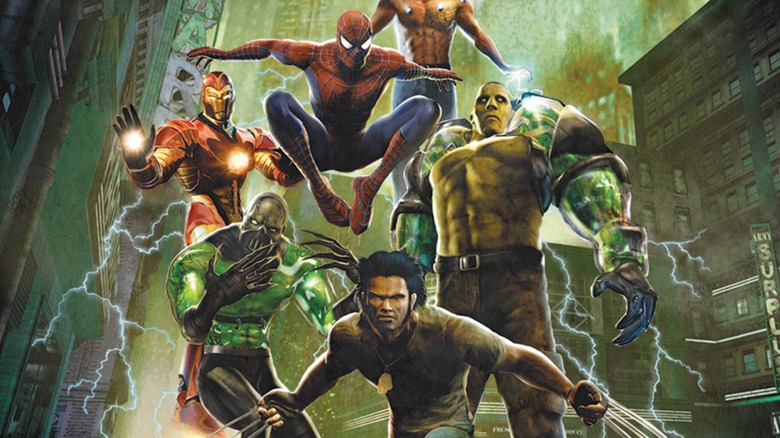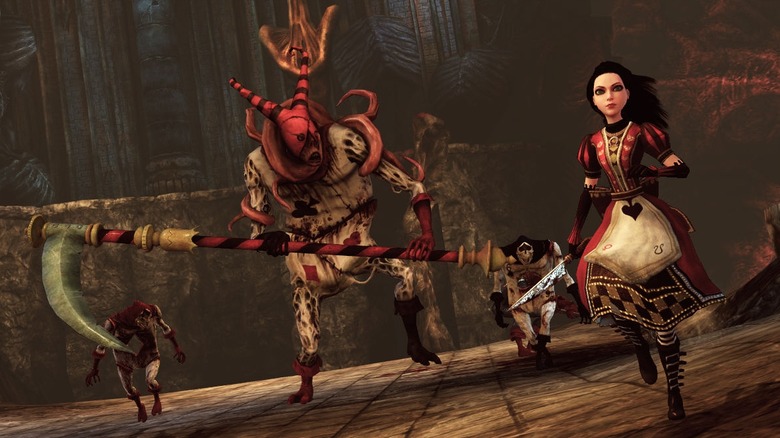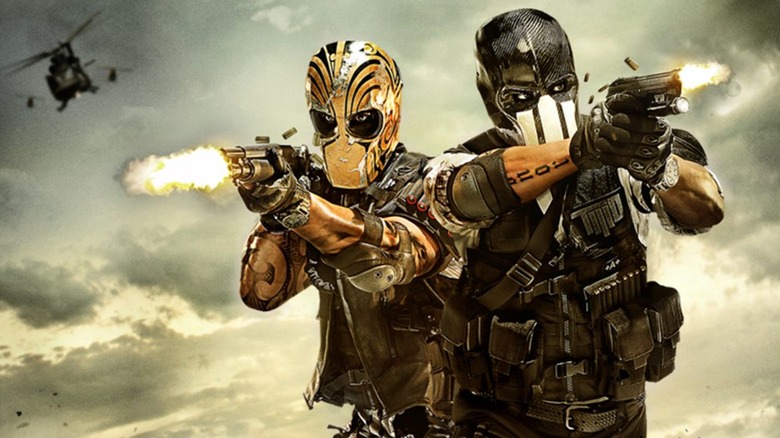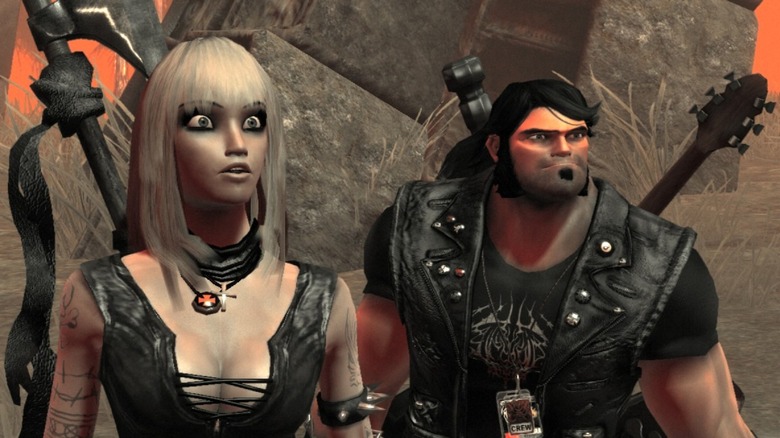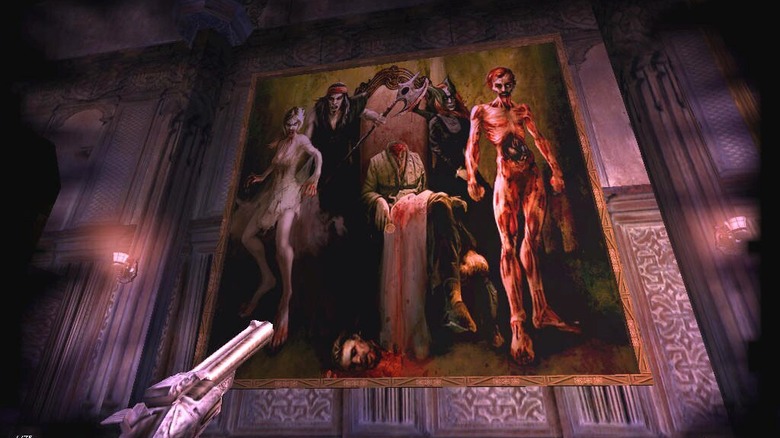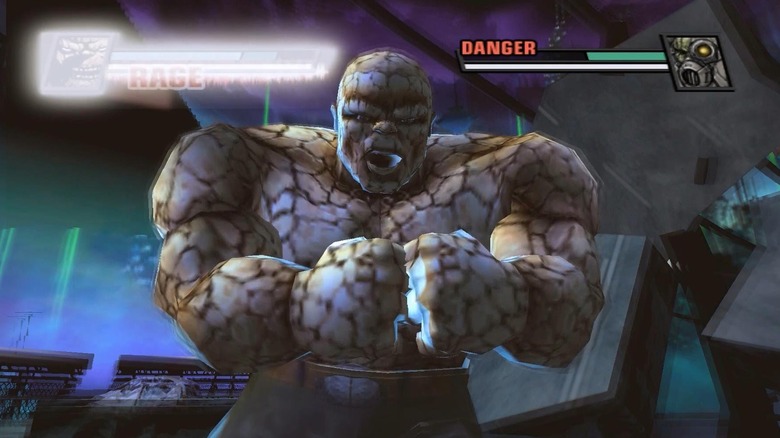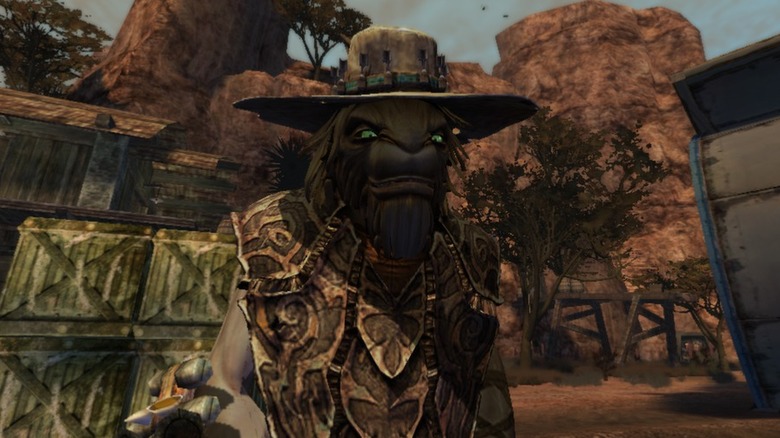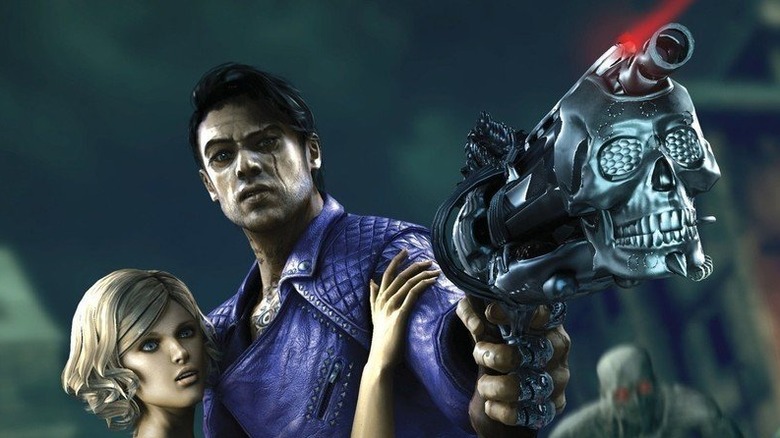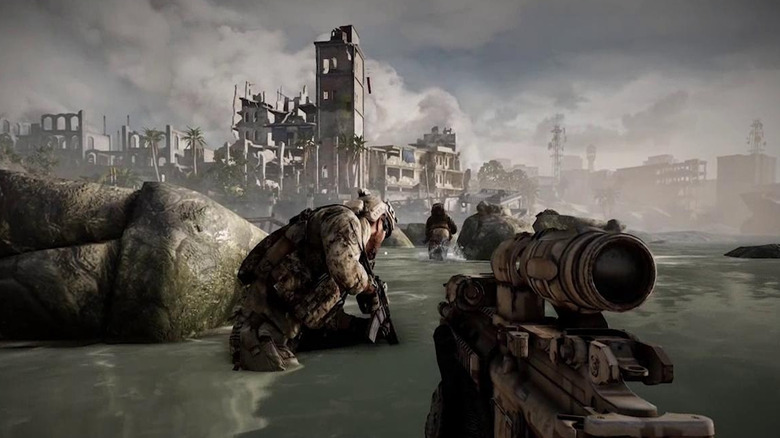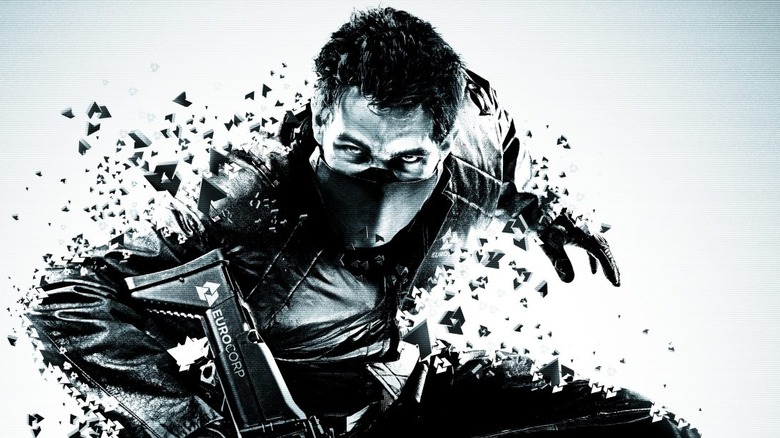EA Games That Totally Flopped Hard
If you're into video games, then it's pretty much a given that you're familiar with Electronic Arts, also known as EA. While they're responsible for publishing some of the most beloved video game franchises of all time, they've also had more than their share of poor decisions and big misses. Even if a lot of work and care goes into putting out the best product possible, not every game can pull off Madden-level sales numbers. Sometimes, a game just doesn't land with the public in the way it's supposed to.
However, not every flop is created equal. There are many different factors that can cause a video game to underperform, even from a major company like EA. The games on this list include poorly conceived reboots and mis-marketed original properties, as well as plenty of games that were just plain bad. Let's take a look at some of EA's biggest missteps, as well as a few games that probably deserved to be hits, but one thing or another stood in the way of their moment in the sun.
Alice: Madness Returns
Alice: Madness Returns was the sequel to American McGee's Alice, a game which brought Lewis Carroll's Alice back through the looking glass and into a dark and twisted version of Wonderland. A full 11 years elapsed between the release of the two games, but somehow fan demand wasn't enough to ensure success.
American McGee, the series creator and head of his namesake studio, has blamed the game's poor sales on a misguided marketing campaign from EA, feeling that too much focus was put on violence and gore, rather than the darkly whimsical elements that make up much of the game. In fact, McGee went so far as to say that he felt EA had attempted to "trick" gamers into thinking they were getting a vastly different product than what was released. However, he eventually walked back these statements, saying "trick" was a poor choice of word.
It probably wasn't the best way to phrase things, but that doesn't change the fact that the game's marketing may very well have resulted in this long-awaited sequel's failure to light up the sales charts. Still, American McGee hasn't given up hope, taking to his blog in early 2019 to explain that his studio is working on a third installment and is hopeful that fan demand could convince EA to take another chance on Alice and complete the trilogy.
Army of Two: The Devil's Cartel
Army of Two: The Devil's Cartel's sales numbers were certainly not aided by the fact that it debuted the same month as the smash-hit Tomb Raider reboot, as well as the same day as BioShock Infinite. Both of those games were critical darlings and huge sellers, so a "run-of-the-mill shooter," as Eurogamer referred to it, never really had a chance against those heavy hitters.
According to statements made by Julian Beak, a former executive producer at Visceral Games Montreal, the studio that developed The Devil's Cartel, the problems with this game ran much deeper than simply the competition it went up against on store shelves. Beak claims that he was brought in late in the game's development process to help steer it in a better direction, as the team's low morale was causing the game's quality to suffer. Whatever the case, the studio's lack of love for the material is pretty apparent in the final product, which received poor reviews and was referred to by Beak himself as "an underwhelming production." The most public sign of this dysfunction may be the fact that EA shuttered Visceral Games Montreal shortly before the release of Army of Two: The Devil's Cartel.
Brütal Legend
One of the greatest tragedies in modern gaming may be the commercial failure of Double Fine Productions' Brütal Legend. This was a unique little title that combined hack-and-slash combat with real-time strategy elements, all filtered through the glory of heavy metal and the star power of Jack Black. Unfortunately, Brütal Legend was another victim of mis-marketing, as early trailers focused solely on the hack-and-slash gameplay without so much as a hint of the game's RTS-inspired sections.
Also, as pointed out by Wired, television commercials for the game failed to capitalize on the heavy metal soundtrack or the rock legends that made up much of its voice cast. Honestly, if you were putting out a game that featured the voices of Motörhead's Lemmy Kilmister and Judas Priest's Rob Halford, wouldn't you want to put some of those bona fides front and center in your ads? Even if the tracks themselves were too expensive to license for commercial purposes, as posited by Wired, you may want to at least give gamers and metalheads a better idea of what the game actually is.
Brütal Legend's woes went beyond marketing. EA and Double Fine were also embroiled in a legal battle with Activision, who had previously declined to publish the game but had suddenly decided they wanted to prevent Brütal Legend's release. Afterwards, a demo for the game was released which also failed to show off the game's varied gameplay mechanics. It all added up to a recipe for weak sales.
Clive Barker's Undying
Clive Barker is the English author and artist who has dreamed up such horror classics as The Books of Blood and The Hellhound Heart. His imagination eventually made the jump to the silver screen as the director of films like Hellraiser and Nightbreed. He also eventually took an interest in the world of video games. Though there were two games based on the film Nightbreed, his first major foray into writing for video games was in 2001 with Clive Barker's Undying. He went all-in, too. Not only did Barker act as a consultant on the game, but he also lent his voice to one of the characters.
Sadly, despite solid reviews, Undying was a major flop. The game sold so poorly, in fact, that a planned port of Undying for the PlayStation 2 was canceled, along with any lofty ideas for a sequel. In fact, the sales spelled the ending of what was meant to be a new series. Undying producer Brady Bell explained, "The Undying franchise is dead. Reviews and player support were awesome, but the sales sucked. I and the whole PC team are heartbroken, but we're moving on."
Clive Barker would eventually return to the world of video games in 2010 when he provided the story for Clive Barker's Jericho, a horror-themed, squad-based first person shooter. These days, Clive Barker's Undying is still remembered as an effective horror game with excellent sound design and "a rich and compelling story."
Marvel Nemesis: Rise of the Imperfects
Marvel Nemesis: Rise of the Imperfects was meant to be the game that kicked off a beautiful friendship between EA and Marvel. The game boasted a cast of fan favorites and new characters co-created by comics superstar Mark Millar, with character designs from comic industry talents such as Jae Lee and Terry Dodson. Meanwhile, Marvel published a six-issue miniseries that fleshed out the game's story and characters a little more, written by Greg Pak.
Rise of the Imperfects released to some rough reviews, with the most common criticisms being bad controls, subpar graphics, and a weak storyline. Marvel Nemesis tried to do too many things at once. A review from Game Over Online focused on the confused genre of Marvel Nemesis, saying, "It might've been a good four-player arena combat game; it could've done all right as a mission-based beat-em-up; and it's just barely possible that this might've worked as a 3D platformer starring Marvel's characters. As a game that tries to be all of those things at once, it's about as fun as gargling mayonnaise."
Between the bad reviews and "lukewarm sales," a planned follow-up was canceled. A few years later, Marvel and EA announced the end of their partnership, freeing up Marvel to shop their characters around to another studio and leaving Marvel Nemesis: Rise of the Imperfects the sole game produced from the deal.
Oddworld: Stranger's Wrath
Despite the offbeat adventure series' significant fanbase, 2005's Oddworld: Stranger's Wrath failed to match the success of previous titles in the Oddworld franchise. Though reviews were positive, sales were less than great. Series creator Lorne Lanning blames the poor sales of the Xbox version on subpar marketing. When speaking with Eurogamer in 2011, Lanning said, "EA did such a crappy job distributing it ... It was sabotaged." Lanning went so far as to claim that EA failed to budget any marketing for the game and essentially dumped it on the market, explaining, "[Stranger's Wrath] didn't perform because it wasn't exposed and it wasn't distributed."
In an interview with GamesIndustry, Lanning explained the benefits of having different metrics to go by in the indie publishing market, saying, "Rather than having to have 1.5 million units [sold] in the opening week or suffer death, now if we have 50,000 sales ... People are still employed and we're able to keep making content." It was noted by Eurogamer that the independently-published HD remaster of Stranger's Wrath, which was available for consoles and mobile platforms, actually managed to outsell the original Xbox release by a significant margin. Lanning's claims of mishandled marketing may make perfect sense when you consider how much better the remake fared.
Shadows of the Damned
This is another interesting case of a game that probably deserved so much better. Shadows of the Damned was a "psychological action thriller" created by the dream team of Resident Evil's Shinji Mikami and Goichi Suda of No More Heroes and Killer7 fame. Those guys making an action game with a punk rock aesthetic that literally takes place in the depths of hell? Its success should have been a no-brainer. In the months leading up to the game, Suda referred to Shadows of the Damned as one of the greatest games he'd ever worked on. Reviews were decent as well, with positive comments pointed toward the game's unique visual style, non-stop action, and quirky humor.
Unfortunately for everyone involved, Shadows of the Damned sold quite poorly upon release, only managing around 24,000 copies. Though it may have been a little too weird for some mainstream audiences, as noted by Engadget, it certainly didn't help Shadows of the Damned's odds to be released around the same time as Infamous 2 and The Legend of Zelda: Ocarina of Time 3D, two bona fide hits. It's a shame, because this could have been the start of a whole new action franchise in the vein of Devil May Cry.
Medal of Honor: Warfighter
The Medal of Honor series was already in trouble before Warfighter was released. The previous entry in the series had been banned from hundreds of stores due to its initial inclusion of the Taliban as playable characters, so it seems that EA really attempted to put their best foot forward in the push towards Warfighter's release. They partnered with Linkin Park, who contributed a song to the game and released a music video tying into the Medal of Honor series, while Linkin Park's Mike Shinoda worked on Warfighter's original score. EA even tried to drum up interest by releasing a Zero Dark Thirty-inspired tie-in DLC alongside the game's limited edition, banking on folks who were excited by the then-upcoming film and, sure, people who wanted to virtually hunt Osama bin Laden.
But Warfighter opened to middling reviews, with much of the criticism aimed at its clichéd story and tired gameplay. It wasn't exactly hated, but many reviewers found the game to be totally uninspired, with GameSpot calling it "just another middle-of-the-road military shooter." Sales were so far below expectations that COO of EA, Peter Moore, announced that the series was being taken "out of the rotation." In other words, Warfighter did so badly that it killed the franchise, at least for the time being.
Syndicate (2012)
Developed by Starbreeze Studios, 2012's Syndicate was a ground-up reboot of the series started by Bullfrog Productions in the early '90s. This new version chucked out the old real-time strategy style, replacing it with some familiar first-person shooter mechanics and a much bigger emphasis on action set-pieces.
Mikael Nermark, CEO of Starbreeze Studios, has said that he felt the deck was stacked against them when they took on the IP, that perhaps fans were determined to dislike a reboot. "If we didn't do an exact copy of the game, they'd hate us," explained Nermark. "If we did do an exact copy, they'd say we didn't innovate. They were never ours to win; it was a lost battle from the get-go." But was that really the case?
The game received middling reviews and was regarded by EA's Frank Gibeau as a gamble on their part that "didn't pay off." However, in contrast to Nermark's anti-reboot theory, Gibeau seemed to think that wasn't the issue, pointing out the relative success of EA's 2012 reboot of SSX. In Worthplaying's otherwise-positive review of Syndicate's Xbox 360 release, they felt the game was lacking "innovation and heart." Maybe the problem wasn't exactly that the reboot was too different from the original, but rather that it changed the series into something that felt all too familiar.

